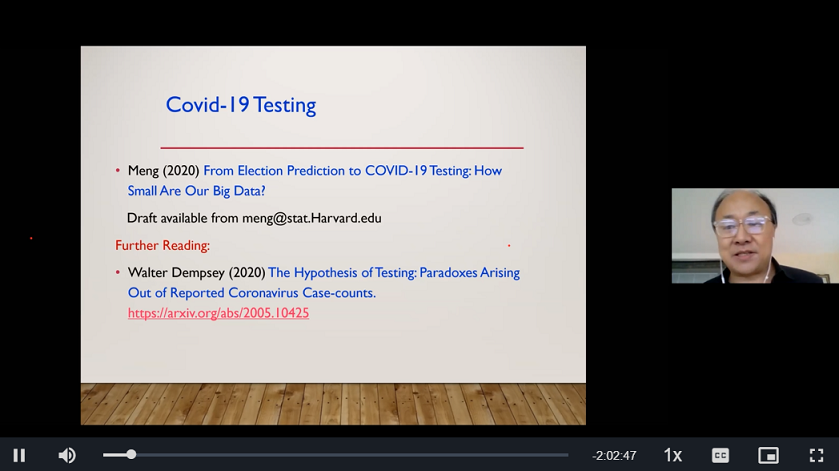Dealing with COVID-19 in Theory and Practice: Session III: Data Science II
Presenters
October 29, 2020
Abstract
--Xiao-Li Meng (Harvard University)
From COVID-19 Testing to Election Prediction: How Small Are Our Big Data?
Meng (2018) Statistical paradises and paradoxes in big data (I): Law of large populations, big data paradox, and the 2016 US presidential election. Annals of Applied Statistics, 685-726: https://statistics.fas.harvard.edu/files/statistics-2/files/statistical_paradises_and_paradoxes.pdf
Isakov and Kuriwaki (2020) Towards Principled Unskewing: Viewing 2020 Election Polls Through a Corrective Lens from 2016. Harvard Data Science Review: https://hdsr.mitpress.mit.edu/pub/cnxbwum6/release/1
(Starts at 00:04:30)
Abstract: The term “Big Data” emphasizes data quantity, not quality. What will be the effective sample size when we take into account the deterioration of data quality because of, for example, the selection bias in COVID-19 testing or the non-response bias in 2016 US Election polling results? This talk provides an answer to such questions, based on the concept of data defect index (ddi) developed in Meng (2018) Statistical paradises and paradoxes in big data (I): Law of large populations, big data paradox, and the 2016 US presidential election. Annals of Applied Statistics, 685-726. It will also discuss briefly the application of ddi for 2020 US Election, as reported in Isakov and Kuriwaki (2020) Towards Principled Unskewing: Viewing 2020 Election Polls Through a Corrective Lens from 2016. Harvard Data Science Review.
--Daniel Weitzner (MIT)
Tracking COVID-19 with Smartphones: Awash in Data, Seeking Insight, Earning Trust
(Starts at 00:49:30)
